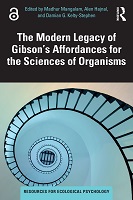The Modern Legacy of Gibson's Affordances for the Sciences of Organisms
Proposal review

Contributor(s)
Mangalam, Madhur (editor)
Hajnal, Alen (editor)
Kelty-Stephen, Damian (editor)
Language
EnglishAbstract
This edited collection provides a comprehensive and empirically informed discussion on affordances and their role in studying goal-directed behavior, covering philosophical, experimental psychological, neuroscientific, and applied perspectives.
Showcasing the work of expert contributors from different backgrounds, the book inspires new directions for future research in affordances. Chapters address questions relating to the definition and perception of affordances, their advantages over stimuli, the relationship between affordances and behavior, and how systems engage with affordances in different tasks and intentions. This question-based format provides a distinctive perspective that allows for a thorough exploration of the expansive field of affordance research.
This book serves as a crucial resource for seasoned scientists, researchers, and undergraduate and graduate students in the fields of ecological psychology, sensation and perception, cognition, and the philosophy of cognitive science, as well as non-academic individuals interested in mind sciences broadly construed. It provides valuable insights and knowledge in these fields, making it an essential reference for those seeking to deepen their understanding in the areas of perception and cognition.
Chapter 5 of this book is freely available as a downloadable Open Access PDF at http://www.taylorfrancis.com under a Creative Commons Attribution-Non Commercial-No Derivatives (CC-BY-NC-ND) 4.0 license.
Keywords
Ecological Psychology,Perception,Action,Scale,Invariance,Complexity,Gibson,SensationDOI
10.4324/9781003396536ISBN
9781003396536, 9781032500195, 9781032500188Publisher
Taylor & FrancisPublisher website
https://taylorandfrancis.com/Publication date and place
2024Imprint
RoutledgeSeries
Resources for Ecological Psychology Series,Classification
Psychology
Cognition and cognitive psychology
